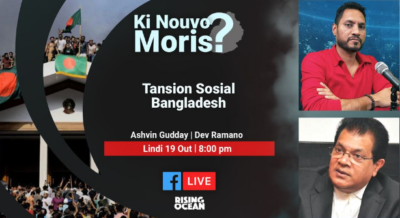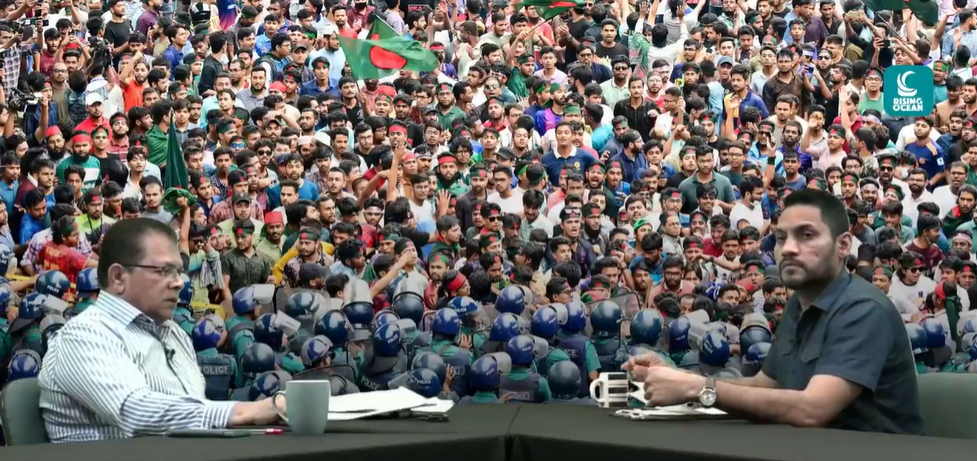The death toll from protests in Bangladesh has risen to at least 300, after approximately 100 people were killed in clashes between protesters and pro-government supporters. The protests stem from long-standing dissatisfaction with Bangladesh’s quota system, which reserved 56% of government positions for certain groups, including 30% for descendants of independence warriors who fought in the 1971 War of Independence. To take stock on the social tension arising in Bangladesh, the set ki nouvo moris of Monday, August 19, 2024, had as guest Dev Ramano, a lawyer by profession and left-wing activist. Ashvin Gudday hosted the show.
The geographical aspect and the history of Bangladesh.
The population of Bangladesh in 2024 will be 173.9 million, making the country one of the densest populations in the world. According to a 2022 census, Bangladesh had a population of 150 million Muslims, which represents 91.04% of its total population. Dev Ramano brings out that to talk about the history of Bangladesh, it must be done in 3 phases. The first phase is before the years 1947 (the colonial era), the years 1947 to 1971 (the partition), and after the years 1971 until 2024. During the colonial period, the country was called Bengal, and it was occupied by the British East India Company. From 1946 to 1970, several factors led to the birth of Bangladesh. At that time, the Bengalis were reluctant to create Pakistan and partition.
“After this phase, those who held power will gradually begin to change their position until they no longer work in the interests of the masses.”
What about the ecological situation in Bangladesh?
Due to its geographical position, Bangladesh is vulnerable to the climate problem. For example, half of the Bangladesh region is less than 10 meters above sea level. In addition, the country is subject to the flow of glaciers located on the Himalayas, and the coastal regions are at the mercy of cyclones and big waves. Indeed, with climate change, the situation is becoming more disastrous for the country. Dev Ramano points out that climate change will have a very big impact on the lives of Bangladeshis. In fact, he deplores that for the years to come, no city or village in the country will be spared, whether with rising water or major flooding. « Agriculture, which is the most practical work done by the population, is in danger. Nowadays, farmers rely on groundwater; the problem with this is that it is filled with arsenic. »
In addition, climate change will cause more harm to the Bangladeshi population because many will be forced to leave their countries to become climate refugees. Every year, at least 500 people are forced to cross borders to escape climate change, highlights the lawyer.
The quota system and the revolt.
For Dev Ramano, this student mobilization should not be perceived as something simple. This revolt is not just a matter of quotas put in place by the government. The quota problem was only a catalyst. Indeed, frustration, the culmination of political, societal, and economic problems for several years, has been the resonance of this uprising.
« It has never been to remove the quota put in place to protect minorities; what Bangladeshi students are calling for is a reform of the quota concerning the 30% of positions reserved for the descendants of freedom fighters. »
The quota problem is not simply a matter of numbers, explains Dev Ramano.
“It is favoritism, corruption, and the recruitment and appointment of people with the help of ruling parties.”
Watch the full debate here:


